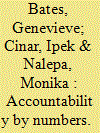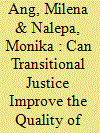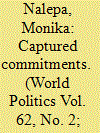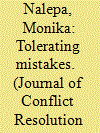|
|
|
Sort Order |
|
|
|
Items / Page
|
|
|
|
|
|
|
| Srl | Item |
| 1 |
ID:
171356


|
|
|
|
|
| Summary/Abstract |
In an era of democratic backsliding, scholars and policymakers wonder if failure to reckon with former authoritarian elites and their collaborators plays a role. Yet without adequate data on the way former autocracies and countries emerging from conflict deal with human rights violators, it is hard to tell if new democracies are unstable because of their failure to reckon with their former authoritarian elites or despite it. We introduce a dataset of personnel transitional justice events that allows scholars to answer such questions, disaggregating these events temporally from the date of a country’s democratization. The time series nature of our data allows scholars to measure key characteristics of states’ dealing with their past and complements existing transitional justice datasets by focusing not only on post-conflict societies and not only on post-authoritarian societies, but on both. To showcase the possibilities our data affords scholars, we use it to develop three novel measures of personnel transitional justice: severity, urgency, and volatility. The granular structure of our data allows researchers to construct additional measures depending on their theoretical questions of interest. We illustrate the use of severity of transitional justice in a regression that also employs data from the Varieties of Democracy project.
|
|
|
|
|
|
|
|
|
|
|
|
|
|
|
|
| 2 |
ID:
169489


|
|
|
|
|
| Summary/Abstract |
Can transitional justice enhance democratic representation in countries recovering from authoritarian rule? The authors argue that lustration, a policy that reveals secret collaboration with the authoritarian regime, can prevent former authoritarian elites from extorting policy concessions from past collaborators who have been elected as politicians in the new regime. Absent lustration, former elites can threaten to reveal information about past collaboration unless the politicians implement policies these elites desire. In this way, lustration policies enable politicians to avoid blackmail and to be responsive to their constituents, improving the quality of representation. The authors show that whether lustration enhances representation depends on its severity and the extent to which dissidents-turned-politicians would suffer if the skeletons in their closets were revealed. The authors also find that the potential to blackmail politicians increases as the ideological distance between authoritarian elites and politicians decreases. They test this theory with original data from the Global Transitional Justice Dataset, which spans eighty-four countries that transitioned to democracy since 1946.
|
|
|
|
|
|
|
|
|
|
|
|
|
|
|
|
| 3 |
ID:
095091


|
|
|
|
|
| Publication |
2010.
|
| Summary/Abstract |
How can outgoing autocrats enforce promises of amnesty once they have left power? Why would incoming opposition parties honor their prior promises of amnesty once they have assumed power and face no independent mechanisms of enforcement? In 1989 autocrats in a number of communist countries offered their respective oppositions free elections in exchange for promises of amnesty. The communists' decision appears irrational given the lack of institutions to enforce these promises of amnesty. What is further puzzling is that the former opposition parties that won elections in many countries actually refrained from implementing transitional justice measures. Their decision to honoring their prior agreements to grant amnesty seems as irrational as the autocrats' decisions to place themselves at the mercy of their opponents. Using an analytic narrative approach, the author explains this paradox by modeling pacted transitions not as simple commitment problems but as games of incomplete information where the uninformed party has "skeletons in its closet"-that is,embarrassing information that provides insurance against the commitments being broken. The author identifies the conditions under which autocrats step down even though they can be punished with transitional justice and illustrates the results with case studies from Czechoslovakia, Poland, and Hungary.
|
|
|
|
|
|
|
|
|
|
|
|
|
|
|
|
| 4 |
ID:
069650


|
|
|
| 5 |
ID:
069630


|
|
|
| 6 |
ID:
148321


|
|
|
|
|
| Summary/Abstract |
This article considers how international criminal justice administered by the International Criminal Court (ICC) affects the possibility of negotiated, peaceful transitions of power in autocracies. We argue that a strong international criminal tribunal can deter dictators’ decisions to peacefully relinquish their power. It does so when the dictator in question has faced a relatively violent opposition, one that was ready to strike a deal with the dictator promising him amnesty in exchange for stepping down. Facing an opposition that “has skeletons in its closet,” the dictator will peacefully exit his office only under a weak ICC regime. We use a cross-national time-series data set spanning 1998 to 2007 to test our theory and find that under a weak ICC regime, the more skeletons the opposition has in its own closet, the more likely is the dictator to peacefully step down from office. Interestingly, this relationship holds, to a large extent, across various levels of dictator’s culpability. If the ICC is strong, the number of skeletons the opposition has in its closet has, for the most part, no effect on the dictator’s likelihood of stepping down.
|
|
|
|
|
|
|
|
|
|
|
|
|
|
|
|
| 7 |
ID:
113756


|
|
|
|
|
| Publication |
2012.
|
| Summary/Abstract |
How do perceptions of procedural fairness shape the preferences that citizens have for transitional justice (TJ) in postauthoritarian countries? This article uses original opinion poll data collected in Poland, Hungary, and the Czech Republic to investigate this question. It shows that differences in the demand for TJ are explained by how citizens perceive whether the TJ process commits errors-that is, whether the innocent are condemned (falsely convicted) or the guilty are exonerated (falsely acquitted). This is so even after accounting for threat perceptions of former autocrats and voting behavior. After comparing the ways in which citizens' perceptions of errors in the TJ process shape their demand for lustration in the three postcommunist countries, the author discusses the implications of these findings for scholars of democratic consolidation, social psychologists, and policy makers designing TJ systems.
|
|
|
|
|
|
|
|
|
|
|
|
|
|
|
|
|
|
|
|
|